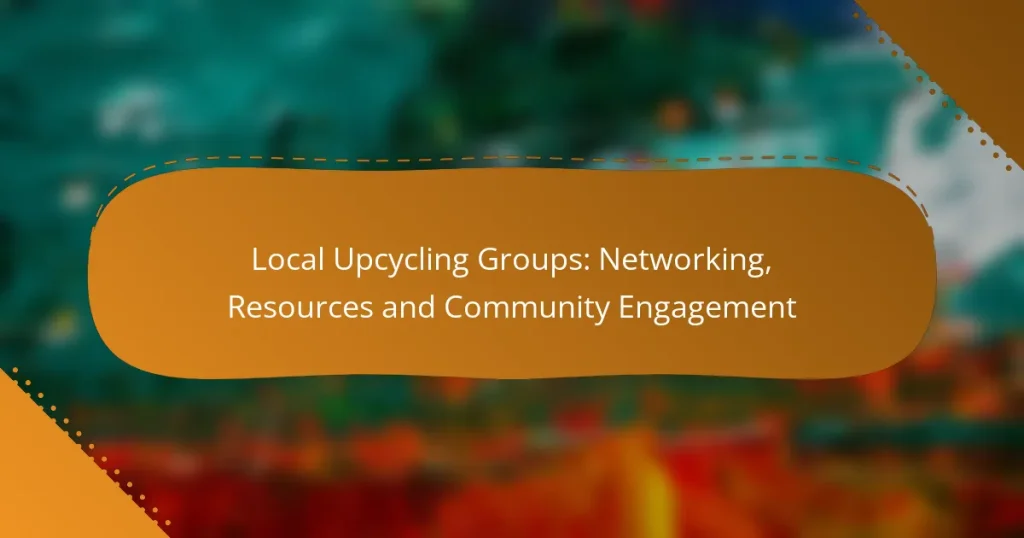Local upcycling groups play a vital role in enhancing community engagement by promoting collaboration and creativity among residents. They offer valuable resources such as workshops and access to tools, enabling individuals to creatively reuse materials while connecting with others who share a commitment to sustainability. By joining these groups, you can tap into a network of like-minded individuals dedicated to innovative practices and resource sharing.
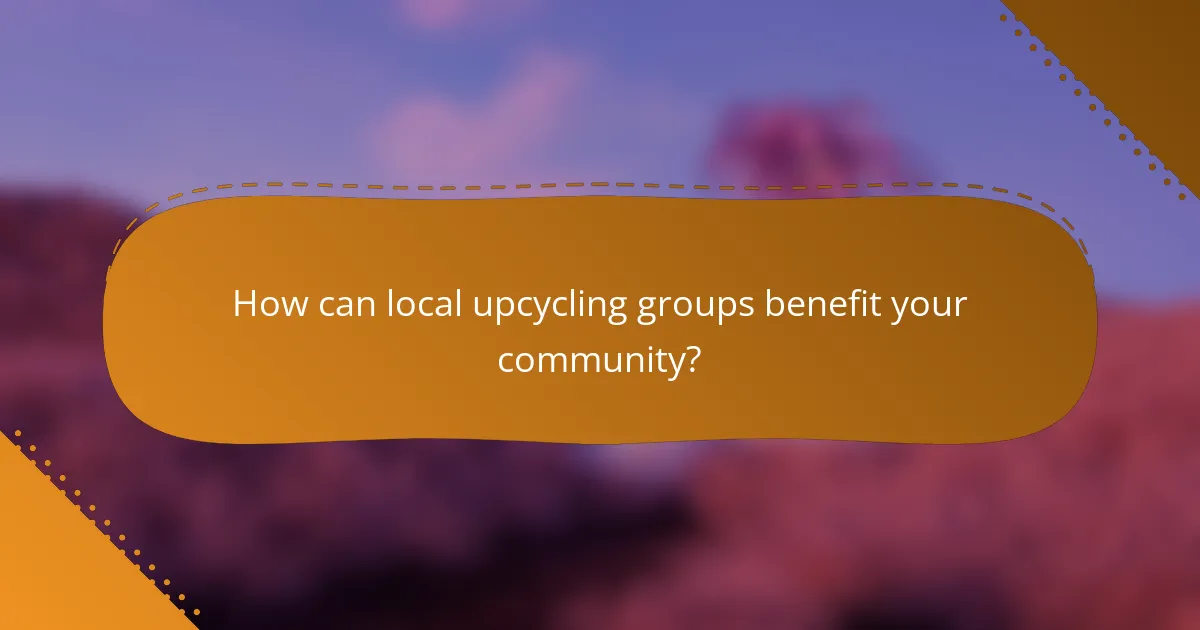
How can local upcycling groups benefit your community?
Local upcycling groups can significantly enhance community engagement by fostering collaboration and creativity among residents. These groups provide a platform for sharing resources, skills, and ideas, ultimately leading to a more sustainable and innovative environment.
Fostering creativity and innovation
Upcycling groups encourage members to think outside the box by transforming waste materials into new, functional items. This process not only sparks creativity but also promotes skill-sharing, where individuals can learn from one another through workshops and collaborative projects.
For instance, a local upcycling group might host a workshop on turning old furniture into stylish home decor. Participants can bring their own items, share techniques, and leave with unique creations, enhancing their creative confidence and sense of community.
Reducing waste and promoting sustainability
By focusing on upcycling, these groups play a vital role in reducing waste and promoting sustainable practices within the community. Members are encouraged to repurpose materials that would otherwise end up in landfills, contributing to a circular economy.
Communities can implement initiatives such as regular swap meets or collection drives for unwanted items, allowing residents to exchange materials rather than discard them. This not only minimizes waste but also raises awareness about sustainability and responsible consumption among community members.
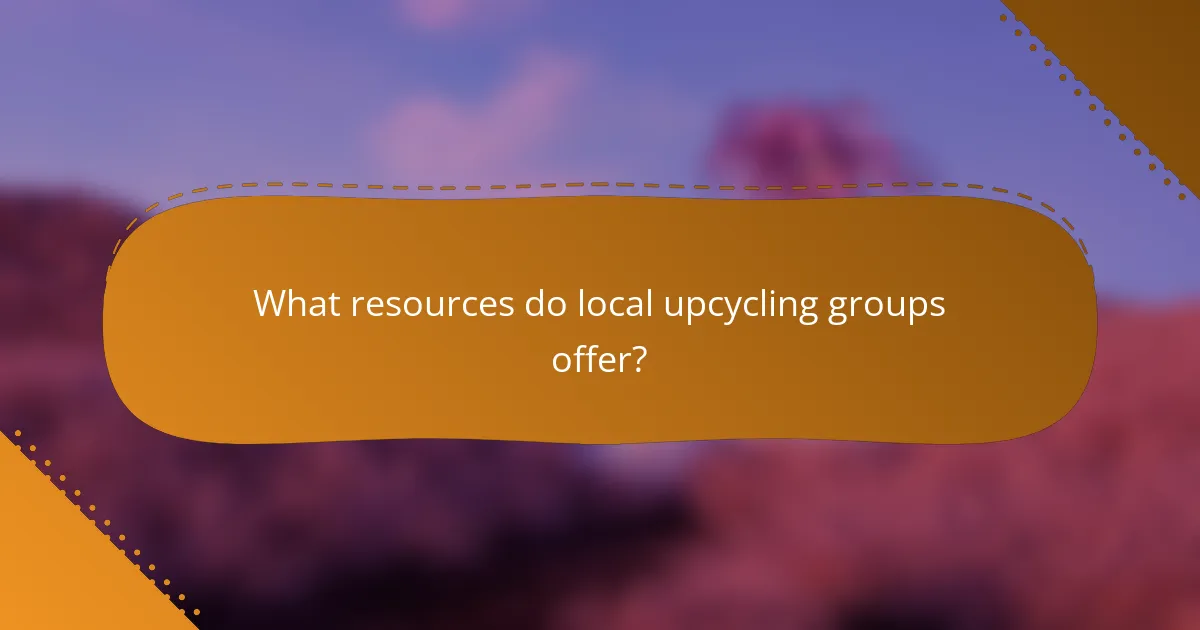
What resources do local upcycling groups offer?
Local upcycling groups provide a variety of resources that facilitate creative reuse of materials, skill development, and community engagement. These resources often include workshops, access to tools, and a network of like-minded individuals dedicated to sustainable practices.
Workshops and skill-sharing sessions
Workshops and skill-sharing sessions are central to local upcycling groups. These events typically cover a range of topics, from basic crafting techniques to advanced upcycling methods. Participants can learn how to transform everyday items into functional or decorative pieces, fostering creativity and sustainability.
Many groups host regular sessions, often free or for a nominal fee, making them accessible to a broad audience. Engaging in these workshops not only enhances individual skills but also strengthens community bonds through shared learning experiences.
Access to materials and tools
Local upcycling groups often provide access to a variety of materials and tools that members can use for their projects. This may include donated items from community members, such as fabric, wood, or furniture, which can be repurposed creatively. Having a dedicated space for these materials encourages collaboration and resource sharing.
Additionally, many groups maintain tool libraries where members can borrow equipment like sewing machines, power tools, or crafting supplies. This access reduces the financial burden on individuals and promotes a culture of sharing and sustainability within the community.

How to find local upcycling groups in your area?
To find local upcycling groups, start by searching online platforms and community resources. These groups often focus on sustainability, creativity, and resource sharing, making it easier to connect with like-minded individuals.
Online platforms like Meetup and Facebook
Online platforms such as Meetup and Facebook are excellent starting points for discovering local upcycling groups. On Meetup, you can search for keywords like “upcycling,” “sustainability,” or “DIY” to find events and gatherings in your area.
Facebook groups dedicated to upcycling often provide a community space for sharing ideas, resources, and upcoming events. Joining these groups allows you to engage with members, ask questions, and participate in local initiatives.
Community centers and local events
Community centers frequently host workshops and events focused on upcycling and sustainability. Check bulletin boards or websites for announcements about upcoming classes or meetups that encourage hands-on learning and collaboration.
Local events, such as craft fairs or environmental festivals, often feature upcycling demonstrations and activities. Attending these events can help you meet fellow enthusiasts and learn about ongoing projects in your community.

What are the key criteria for joining an upcycling group?
Joining an upcycling group typically requires a commitment to sustainability, creativity, and community engagement. Members should be willing to share resources, skills, and ideas to promote upcycling practices.
Membership requirements and fees
Most upcycling groups have specific membership requirements that may include an application process, attendance at introductory meetings, or participation in workshops. Fees can vary widely; some groups charge nominal annual dues, while others operate on a donation basis or may be entirely free.
It’s advisable to check the specific requirements of the group you’re interested in, as some may require members to contribute materials or volunteer time for community projects. This can enhance your experience and foster stronger connections within the group.
Group values and mission alignment
Understanding the values and mission of an upcycling group is crucial for ensuring a good fit. Many groups prioritize sustainability, creativity, and community involvement, so aligning your personal values with those of the group can enhance your participation and satisfaction.
Before joining, consider attending a few meetings or events to gauge the group’s culture and objectives. Engaging with current members can provide insights into how well the group’s mission aligns with your own goals regarding upcycling and environmental stewardship.
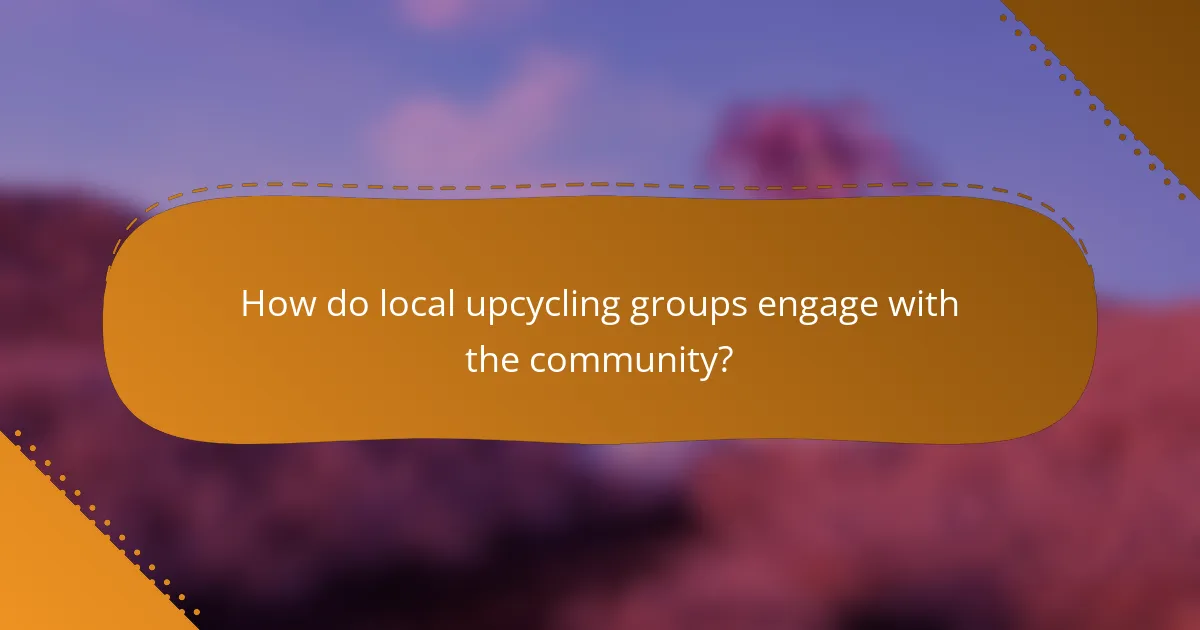
How do local upcycling groups engage with the community?
Local upcycling groups engage with the community by organizing events, fostering collaborations, and creating platforms for sharing resources. These initiatives not only promote sustainability but also strengthen community ties and encourage creative reuse of materials.
Hosting community events and markets
Community events and markets are vital for local upcycling groups as they provide a space for members to showcase their creations and share ideas. These gatherings can include workshops, swap meets, and craft fairs, allowing participants to learn new skills and exchange materials.
For example, a monthly upcycling market might feature local artisans selling their repurposed goods, along with demonstrations on how to transform everyday items. Such events typically attract a diverse audience, fostering a sense of community and shared purpose.
Collaborating with local businesses
Collaboration with local businesses enhances the impact of upcycling groups by pooling resources and expanding outreach. Businesses can provide materials, sponsorship, or venues for events, while upcycling groups can offer creative solutions for waste reduction.
For instance, a local café might partner with an upcycling group to host a workshop where patrons learn to create planters from discarded coffee cups. This not only promotes sustainability but also draws customers to the business, creating a win-win scenario.

What are the challenges faced by local upcycling groups?
Local upcycling groups encounter several challenges that can hinder their effectiveness and growth. Key issues include limited funding and resources, as well as difficulties in maintaining a consistent member base.
Funding and resource limitations
Many local upcycling groups struggle with securing adequate funding to support their initiatives. This can limit their ability to purchase materials, tools, or space for workshops and events. Often, groups rely on small grants, donations, or membership fees, which may not cover all operational costs.
To address funding limitations, groups can explore partnerships with local businesses or apply for community grants. Organizing fundraising events, such as workshops or craft fairs, can also generate additional income while promoting community engagement.
Building a consistent member base
Attracting and retaining members is crucial for the sustainability of local upcycling groups. Fluctuations in membership can disrupt project continuity and diminish community impact. Groups often face challenges in reaching out to new members and keeping existing ones engaged.
To build a stable member base, groups should focus on creating a welcoming environment and offering diverse activities that cater to various interests. Regular communication through newsletters or social media can keep members informed and involved. Additionally, hosting open events can draw in potential new members and showcase the group’s mission and projects.
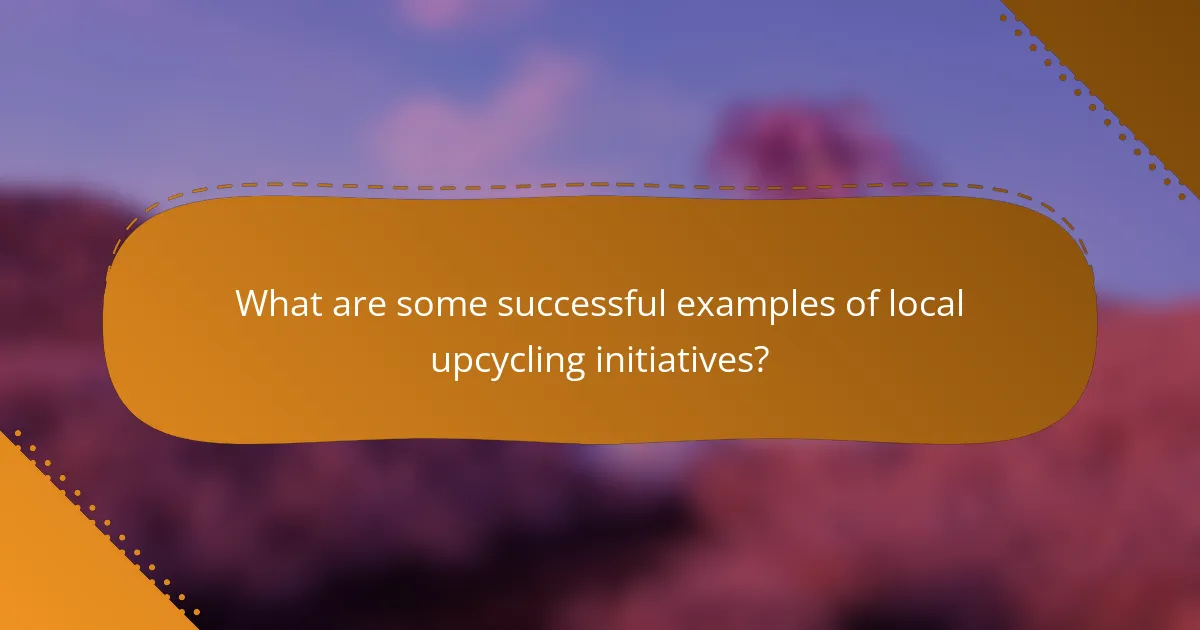
What are some successful examples of local upcycling initiatives?
Successful local upcycling initiatives often involve community engagement, resource sharing, and creative repurposing of materials. These projects not only reduce waste but also foster connections among residents and promote sustainable practices.
Community Workshops
Community workshops are a popular method for promoting upcycling. These events bring together individuals to learn skills such as furniture restoration, textile repurposing, or crafting with recycled materials. Participants often leave with new skills and a sense of accomplishment.
For example, a local workshop might focus on turning old pallets into garden furniture, allowing participants to create functional items while learning about sustainable practices. These workshops can be organized by local nonprofits or community centers, often at little to no cost.
Swap Events
Swap events encourage community members to exchange items they no longer need, reducing waste and promoting upcycling. Participants bring items like clothing, books, or household goods to trade with others, giving these items a new life.
These events can be organized seasonally and often attract a diverse group of people. They not only help reduce clutter but also foster a sense of community and collaboration among participants.
Local Upcycling Markets
Local upcycling markets showcase products made from repurposed materials, providing artisans a platform to sell their creations. These markets often feature a variety of items, from jewelry made from discarded electronics to furniture crafted from reclaimed wood.
By supporting local artisans, these markets promote sustainable practices and encourage consumers to consider the environmental impact of their purchases. They also create a vibrant community space where creativity and sustainability intersect.
